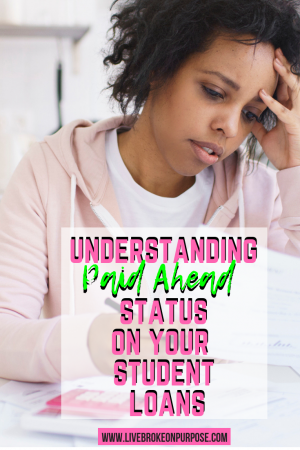Last week, the President announced that he’s suspending federal student loan interest until further notice. These federal loans include direct loans, Family Federal Education Loans, Pell Grants, Perkins Loans, and Grad Plus Loans. Unfortunately, private student loans do not qualify. At present, student loan providers are still waiting on instruction from the government on how to enforce this new and unprecedented rule, but once it goes into effect is thought that it will be retroactive through March 13th, 2020.
Let’s break down what this means for you in the present and the future.
Federal student loan interest suspension and reduced or lost wages.
Presently, the suspension of federal student loan interest means absolutely nothing to those who are dealing with lost or reduced wages without some extra work involved. Your payment will still be due every single month, and you may be penalized if you can’t make the payment. One of the ways this MIGHT work for you is if you were to file for a deferment or forbearance due to financial difficulty. If approved, a forbearance could pause your student loan payments for up to three years. Should the “no-interest” rule stay in effect, you would be able to benefit from having the additional money from not making the payment, as well, and not have to worry about your interest on your loan accruing daily. This move would not only keep money in your pocket but save you thousands of dollars over the life of your loan, depending on how much you currently owe.
While forbearance may sound like a good idea, here’s the catch (there’s always a catch.) Forbearance is granted on a cause by case basis and is not guaranteed. Keep in mind the President could also reverse this rule a month after it goes into effect, so putting your loans into forbearance to take advantage of the interest suspension may not be the best idea in the long run.
Additionally, if you’ve lost wages, you may be eligible for an income-driven-payment plan. Under the income-driven repayment plan, your monthly bill is capped based on your discretionary income (the amount of income you have after all essential bills are paid). For many, this is advantageous as their bill can drop to as low as $0 per month. Any remaining debt is then forgiven after 20-25 years. Requalification for this type of loan is required yearly; however, at present, it could prove to be a lifeline in helping you keep money in your pocket. To see if you qualify, contact your service loan provider and ask your eligibility for the program.
Federal Loan Interest Suspension if you can still afford to make your student loan payment.
Now let’s think about the future implications of the “no interest” rule on those who can still afford to make payments on their federal student loans. For some, this rule comes as a breath of fresh air. Student loan interest accrues on your balance EVERY SINGLE DAY. There are situations where more than 75% of someone’s payment will be applied to the interest before it touches any part of the principle. Suspension of interest will allow those who can still make their payments the opportunity to pay down their principal balance, thus giving them the ability to save thousands over the life of their loan, possibly. Take some time to do the math and see how much a pause in interest would save you over the life of your loan. You can find the formula for calculating student loan interest here in my IG highlights.
Don’t take this opportunity for granted. Most people would go to extremes to have their student loan interest lowered and the opportunity to get ahead on payments. To circumvent student loan interest I even transferred part of my student loan to a 0% interest credit card offer. Revisit your financial plan and see if this would be a prime opportunity for you to pivot more money to paying off your student loans so that you can come out even further ahead in the end.
So what should you do if you find yourself in a situation where you are unable to make your monthly student loan payments?
- Call your student loan service provider and let them know about your situation. This pandemic is affecting everyone, and there may be other options that can be explored now that we are in a state of emergency.
- Don’t be afraid to reach out to your community for help. Over the past several days, I’ve seen several threads on twitter and Facebook with people offering to support those who those impacted by making a bill payment on their behalf.
- Revisit your financial plan. Consider what can be temporarily paused, reduced, or cut out to make sure all your necessities are covered.
- Stay Faithful. Your provision comes from the Provider. Philippians 4:19 tells us that God will supply all of our needs. This promise is one of the many promises that he makes to his children.
Last but not least, I am here to offer advice and support as best as I can.




